TBI Heroes: Jyotsna Sitling – A Green Warrior
Jyotsna Sitling - India's first female tribal IFS officer is a force to reckon with. She changed the outlook of the Valley of Flowers and undertook several initiatives to ensure sustenance of environmental efforts
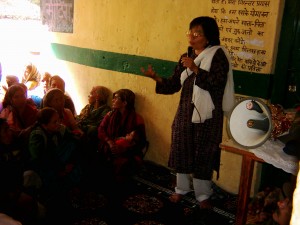
An entire mountain region would have been left to deteriorate into a plastic garbage dump. A National Park would have been shamefully left to a degenerate, unable to gain the recognition worth its value. A hill range would have lost an unbelievable amount of soil cover and destroyed the livelihood of thousands of people. All this if Jyotsna Sitling had not done some of the most admirable jobs in public service!
She’s India’s first female tribal IFS officer, genuinely passionate about the environment, who has carried her spirit for work over the years to become the recipient of the paramount honour for environment conservation in India – the Indira Gandhi Paryavaran Puraskar. Not many would have expected Jyotsna, hailing from a nondescript village in Bengal, to move the mountains. And she indeed did move the range of Himalayas in Uttarakhand away from the course its fate was fast running into.
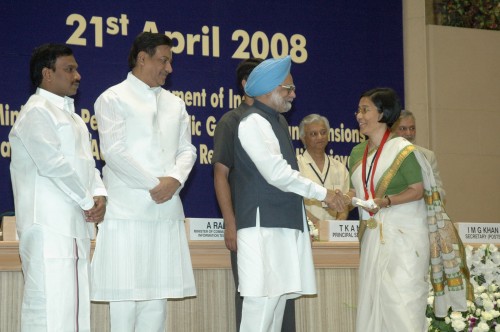
It was back in 2002 that Jyotsna joined the Nanda Devi Biosphere in Uttarakhand, as its Director. 5800 acres of land to manage, with two national parks and a sanctuary to revive, and closely intertwined livelihood of people – a short and sweet Jyotsna saw challenges hurled at her in abundance. She had the toughest of jobs in the most beautiful of lands.
The Valley of Flowers National Park, an unmatched landscape with the rarest of flora and fauna, hosts a buffer zone with a 19-km trail that leads to Hemkund Sahib, the highest Gurdwara in the world. The breath-taking trail was literally breath-taking, stinking as it was, with plastic and other dumps that the pilgrims left behind remorselessly for three decades. Jyotsna decided to start vigorous campaigns by involving the local community. She called for a garbage collection initiative by the community and to her surprise they collected 15 truckloads of garbage weighing up to 50 tonnes! The entire mass was sent for recycling and the valley started getting rid of its pollutants.
Now redemption for the past mistakes was achieved, but sustaining this achievement for the future needed some more things to change. The next task was to regulate the 400 odd unorganized shops that massively contributed to polluting the trek trail to the Gurdwara. But the shops couldn’t be ruthlessly removed. And environment conservation is not the easiest of things to speak about when livelihoods are at stake. Adding to it, the forest officials and the local community were not on the best terms. So there Jyotsna was – with the tasks of bridging the animosity to build a relationship with the people, working out the reversal of the damage done to the environment and helping develop the quality of lives of the people.
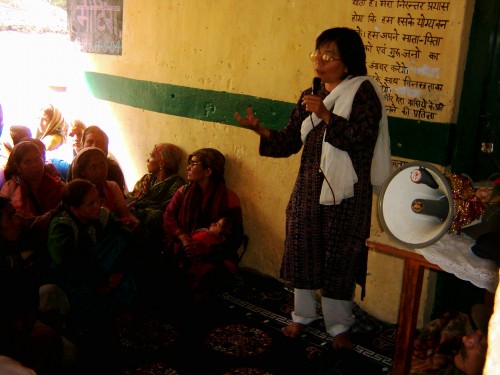
Jyotsna studied the issue with putting both the environmental conservation and the livelihood of the people at equal priority. And when she combined both, the result was economic gain for the people and conscious and sustainable conservation for the environment.
She sat down with the shop owners for convincing them to reduce the number of shops to one per family. She explained that their incomes were getting grossly divided and the environment was also suffering. She literally spent six to seven continuous days and nights to explain, convince and take people into confidence to finally agree to her plan. There was tremendous difficulty in deciding who gets which land. But at the end of it all, the number of shops came down from 400 to 76 – a huge relief for the Valley of Flowers, and people were happy to see that Jyotsna’s idea worked well for them. Notably, Jyotsna was successful in making the hostility between the forest officials and the people fade away.
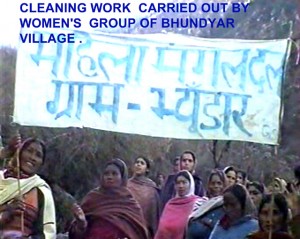
Jyotsna put in many checks so that what was achieved was not lost in the years to come. She put the systems into place for responsible tourism through an Eco Development Committee (EDC) of the local stakeholder villagers. The Eco fee that she introduced helped in bringing funds for cleaning operations and for building systems on green value chain for services to the pilgrims without depending on government funds. She worked out insurance policies for the pilgrims. This generated a continuous influx of money for the sustenance and development of the region. Many small businesses for the service of pilgrims, like renting plastic coats, were introduced such that more income-generating opportunities were created thus linking livelihood concerns of locals with the conservation realities of the area.
Jyotsna distilled her experience on the effect of mountaineering activity on the environment during her tenure as Director, Nanda Devi Biosphere Reserve (2002 to 2004) and put together an entire guideline for mountaineering in Uttarakhand in 2004. This guideline is first of its kind in any state in India. She says it’s all about making the markets work for environment and making the community the real stakeholders.
Concurrently, she also carried out many other activities to rejuvenate the face of the Valley of Flowers National Park. The crowning glory came when all these efforts led to the declaration of the Park as a World Heritage Site by UNESCO in 2005.
Another of Jyotsna’s major initiatives between 1997 and 2000 was in the erosion-prone zone of the Shivalik range near the Doon Valley. She mobilized a community of nearly eleven thousand people across 82 villages to spend at least 1 day in a year for the restoration of their villages. Together they planted 3,82,000 plants and sowed over 70 kgs of seeds of various plant species, saving the fate of the villages that lay close to 358 strategic erosion-prone locations. What could be said about the impact of this incredible act of service?
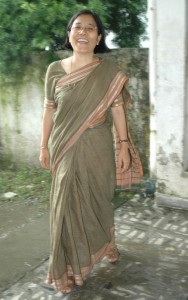
She’s done some of the most incredible works ever for the environment in our country. But she’s not the one who’d take her successes to her head. She’s a powerhouse of unstoppable energy who constantly traverses that extra mile to do extraordinary work. Jyotsna, an alumna of IIM Bangalore, today is the Project Director of Livelihoods Improvement Project for the Himalayas, Uttarakhand. She is 49 and chose to stay single. She has adopted the family of her caretaker maid. The family lives with her and Jyotsna takes great interest in the education of their son.
Last year Jyotsna met with an accident causing her head injuries that left her with 16 stitches and many months for recovery. But this is what she says – ‘It was actually an enriching experience to go through the after-effects of the accident and recovering from it!” She’s unbelievably awesome!
If you found our stories insightful, informative, or even just enjoyable, we invite you to consider making a voluntary payment to support the work we do at The Better India. Your contribution helps us continue producing quality content that educates, inspires, and drives positive change.
Choose one of the payment options below for your contribution-
By paying for the stories you value, you directly contribute to sustaining our efforts focused on making a difference in the world. Together, let’s ensure that impactful stories continue to be told and shared, enriching lives and communities alike.
Thank you for your support. Here are some frequently asked questions you might find helpful to know why you are contributing?


This story made me
-
97
-
121
-
89
-
167











